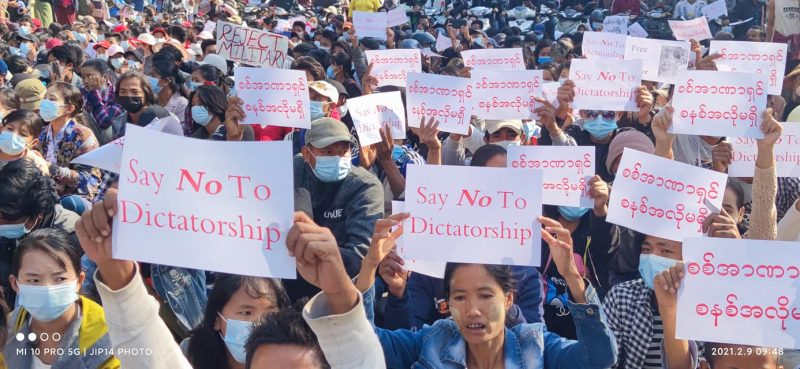
Anti-coup protests have been organized across Myanmar despite the ban on mass gathering. Photo supplied to Global Voices, used with permission
Civil society groups in Myanmar are opposing the draft “Cyber Security Bill” which was introduced amid growing opposition to the military government.
The bill was sent by the Ministry of Transport and Communications to local telecommunication companies for their review on February 9. The document was leaked online, and this allowed the public to study its content.
The bill has 76 sections which contain provisions that empower authorities to order websites to be blocked, content removed, and individuals to be charged for spreading misinformation.
The bill was presented days after the military staged a coup. It is feared that if passed into law, the measure will be used to further stifle free speech in the country. Internet was blocked in Myanmar on February 1, the day of the coup; and on February 6 and 7. Despite the ban on protests, the civil disobedience movement, which has mobilized thousands across the country, continued to gather support. The internet has played an important role in facilitating the spread of news and other updates about the coup and the democracy movement.
More than 200 Myanmar-based civil society groups have signed a statement rejecting the bill. In it, they questioned the authority of the military-led Ministry to draft a proposed law.
The issuance of the “bill” is evidence that the military has not only attempted a coup d’état, but is also exercising undue legislative power unlawfully to oppress the public.
…the “bill” includes clauses which violate human rights including the rights to freedom of expression, data protection and privacy, and other democratic principles and human rights in the online space.
One of the clauses highlighted by human rights groups pertains to the obligation of IT companies to submit user data if requested by authorities.
Art 30 & 31 from chapter 9 of the “bill” states, online platforms (FB, Twitter..etc) to keep user's details (IP, phone, ID, address, usage data, and other necessary data as directed by the ministry) for 3 yr and give it to them when asked. #WhatsHappeningInMyanmar #myanmarcoup pic.twitter.com/7tpTmZZKeN
— MIDO (@myanmarido) February 10, 2021
The Myanmar Computer Federation, which was asked by the military government to comment on the bill, also rejected the measure and suggested that stakeholders should be consulted about it. It added that elected Members of Parliament should draft the bill.
STATEMENT: Myanmar Computer Federation, the mother organization of all computer associations in the country “strongly opposed” military council’s the draft of “Cyber Security law” sent to them for reviewing and recommend to go through proper legitimate procedures. Thread/1 pic.twitter.com/NyNYxBCvVi
— Hnin Zaw (@hninyadanazaw) February 12, 2021
Vicky Bowman, director of the Myanmar Centre for Responsible Business, told Frontier magazine that the bill will negatively affect the business operation of IT companies:
A law like this which does not protect human rights makes it very difficult for companies committed to respecting human rights to operate in Myanmar, which includes those offering online services.
U Aung Myo Min, director of Human Right Education Institute of Burma told Myanmar Times that the bill could legitimize military control of cyberspace:
It sounds more oppressive than protective. It can be expected that the true aim of the bill is to repress freedom of expression online and ban social networks.
This point was also echoed by Justice for Myanmar NGO, whose website was blocked in 2020 after exposing the anomalous business transactions of military officials:
#Myanmar military to enact a new Cyber Security Bill. Military “already controls 2 mobile networks, #Mytel & MPT, but now they want to control all online info through an unlawful process & punish those who dare practice their fundamental rights, including FOE”. #Myanmarcoup https://t.co/e2OF6AyUxR
— Justice For Myanmar (@JusticeMyanmar) February 11, 2021
Myanmar’s military government has intensified its crackdown on dissenting voices as the coup entered its second week. Protesters, activists, and journalists have been arrested for their role in the civil disobedience movement. The internet was blocked again on February 15, raising fears that this is a prelude to another wave of mass arrests.
Internet connections in Myanmar have been cut off again since around 1am Monday amid fears of a crackdown on recent protests. The move comes as armored personnel carriers and other military vehicles have been seen in various locations around Yangon.
#WhatsHappeningInMyanmar pic.twitter.com/mVwC5uWe8M
— Myanmar Now (@Myanmar_Now_Eng) February 14, 2021




1 comment
so many countries who condemn the violence by the junta have connections with them , the junta take over the myanmar embassy in london from a democratically elected government with the blessing of the uk government ,,,which side of the fence is the question that needs answering ,,